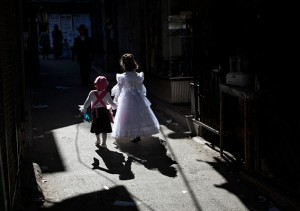Dear Friends,
The devastation in Japan has captured the world’s attention and benefitted Gadaffi as his well-equipped military repels and brutalizes their own countrymen. There is a full page debate in today’s National Post on whether or not Obama should use force against Libya. On the yes side, Paul Wolfowitz in Washington argues that “The rebels want international freedom. We should give it to them.” On the no side, Richard N. Haas in New York City puts forth the opinion that “The last thing we need is another vaguely defined intervention in a place where U.S. interests are not vital.”
Uncannily, last night I came across an anniversary tribute to the Op-Ed section of The New York Times from last year which I had saved, and which contained certain op-ed pieces that appeared over the years on various topics and were reprinted in this special anniversary edition. The Op-Ed section was an innovative idea when it was conceived – a full page devoted every week to readers where they could send in their views on virtually any topic. The following is a piece that was appeared in the Op-Ed section on August 4, 1993. It was written by Joseph Brodsky. Brodsky was a poet who received the Nobel Prize in Literature in 1987. He died in 1996.
AUG 4, 1993
Balkan Excuses
AS AMERICA LIES in its state-induced moral stupor, lots of people die violent deaths all over the place, particularly in the Balkans. When it comes to externalizing evil, few things can rival geography or, for that matter, history.
What’s happening now in the Balkans is very simple: It is a bloodbath. Terms such as “Serbs,” “Croats,” “Bosnians” mean absolutely nothing. Any other combination of vowels and consonants will amount to the same thing: killing people. Neither religious distinctions – Orthodox, Catholic, Muslim – nor ethnic ones are of any consequence.
Evocations of history here are nonsense. Whenever one pulls the trigger to rectify history’s mistake, one lies. For history makes no mistakes, since it has no purpose. One quotes history to avoid responsibility or pangs of conscience.
Besides, the Balkan bloodshed is essentially a short-term project. Set in motion by the local heads of state, its main purpose is to keep them in power for as long as possible. For want of any binding issue (economic or ideological), it is prosecuted under the banner of a retroactive utopia called nationalism.
All this needn’t have happened. Once it began, it could have been stopped. The fact that it hasn’t been stopped means that its continuation is to somebody’s advantage. We may ask, to whose? After all, ethical as we are, we are also a country of the bottom line. If somebody who can stop a bloodbath doesn’t do it, it means that he profits from it.
photos of the day
March 16, 2011
A woman in Seoul, Korea, walks away from a message wall after writing a note to the victims of last week’s earthquake and tsunami in Japan. Truth Leem/Reuters
 A six-day-old female chimpanzee clings to her mother, Uschi, at the Bratislava Zoo in Slovakia. The young chimpanzee is the first chimpanzee born in the zoo since 1990. Radovan Stoklasa/Reuters
A six-day-old female chimpanzee clings to her mother, Uschi, at the Bratislava Zoo in Slovakia. The young chimpanzee is the first chimpanzee born in the zoo since 1990. Radovan Stoklasa/Reuters
 Ultra-Orthodox Jewish children dressed in costumes walk through the religious Mea Shearim neighborhood in Jerusalem ahead of the upcoming Purim holiday. The Jewish holiday of Purim celebrates the Jews’ salvation from genocide in ancient Persia, as recounted in the Scroll of Esther. Sebastian Scheiner/AP
Ultra-Orthodox Jewish children dressed in costumes walk through the religious Mea Shearim neighborhood in Jerusalem ahead of the upcoming Purim holiday. The Jewish holiday of Purim celebrates the Jews’ salvation from genocide in ancient Persia, as recounted in the Scroll of Esther. Sebastian Scheiner/AP
Market Commentary:
Canada
By Matt Walcoff
March 16 (Bloomberg) — Canadian stocks fell for a third day, led by banks and uranium producers, after the U.S. reported housing starts declined to the least since April 2009 and the Japanese nuclear crisis continued.
Royal Bank of Canada, the country’s largest lender by assets, dropped 0.9 percent after U.S. building permits slumped to a record low in February. Cameco Corp., the world’s second- largest uranium producer, lost 8.2 percent after the International Atomic Energy Agency said four nuclear units in Japan have core damage. Silver reseller Silver Wheaton Corp. retreated 2.4 percent as precious-metals producers fell.
The Standard & Poor’s/TSX Composite Index decreased 22.14 points, or 0.2 percent, to 13,524.82. The index had jumped as much as 1 percent and declined as much as 0.9 percent earlier.
“The market really doesn’t like uncertainty,” said Jeff Bradacs, a Toronto-based senior investment analyst for a team at Manulife Asset Management that oversees C$1.7 billion ($1.7 billion). “Until we have clarity on Japan, I would expect the volatility to remain.”
The S&P/TSX had fallen 5 percent from March 4 to yesterday as the Thomson Reuters/Jefferies CRB Commodity Price Index dropped 6.8 percent. Crude oil retreated after surging to a 29- month high as civil war broke out in Libya. Gold and silver dropped as investors sold precious metals to raise cash as equity markets dipped after the March 11 earthquake in Japan.
“Front and center is the devastation and uncertainty in Japan, but you’ve also got ongoing instability in the Middle East; you’ve got continued issues with sovereign credit in Europe,” said Murray Leith, who helps manage about C$6.5 billion as a money manager at Odlum Brown Ltd. in Vancouver.
“There’s some nervousness, some jumpiness.”
The five largest Canadian banks declined after the U.S. Commerce Department said housing starts retreated 23 percent to a 479,000 annual rate. Economists had forecast a figure of 566,000, according to the median of 74 estimates in a Bloomberg survey.
Royal Bank lost 0.9 percent to C$59.06. Toronto-Dominion Bank, the parent of Portland, Maine-based TD Bank NA and Cherry Hill, New Jersey-based Commerce Bancorp Inc., decreased 0.7 percent to C$82.72. Bank of Nova Scotia, Canada’s No. 3 lender by assets, slipped 1.1 percent to C$57.61.
Uranium-mining companies fell for a third day as the nuclear crisis in Japan jeopardized a renaissance in nuclear power. Gregory B. Jaczko, the chairman of the U.S. Nuclear Regulatory Commission, told a Congressional committee that no water remains in the spent-fuel pool at the Fukushima Daiichi nuclear power plant.
Cameco Corp., the world’s second-largest uranium producer, declined 8.2 percent to C$29.43 to extend its weekly drop to 19 percent. Uranium One Inc., a mining company controlled by Moscow-based ARMZ Uranium Holding, slumped 5.4 percent to C$3.52 for a 41 percent plunge on the week.
Mantra Resources Ltd., a uranium producer based in Perth, Australia, tumbled 33 percent to C$4.70 after ARMZ said it wants to renegotiate its A$1.2 billion ($1.18 billion) deal to buy the company.
Westshore Terminals Investment Corp., which owns a coal- storage and loading facility on the Pacific Ocean, slumped 6.3 percent, the most since July 2009, to C$22.56. Japan is the largest buyer of Canadian coal exports, according to Statistics Canada.
Precious-metals producers declined as gold and silver retreated in electronic trading after market close in New York.
Silver Wheaton decreased 2.4 percent to C$38.12. Kinross Gold Corp., Canada’s third-largest gold producer, slipped 1.6 percent to a 27-month low of C$14.29. Eastern Platinum Ltd., which mines in South Africa, sank 7.8 percent to a six-month low of C$1.31 as the metal extended its monthly decline to 6.4 percent.
Semafo Inc., which mines gold in Africa, rose 5.5 percent from a seven-month low to C$8.52. The company is scheduled to release fourth-quarter financial results today.
Most S&P/TSX energy companies advanced as oil climbed on speculation the unrest in Bahrain may spread to Saudi Arabia.
Imperial Oil Ltd., Canada’s second-largest energy company, increased 2.1 percent to C$50.05 for its first gain in eight days. EnCana Corp., the country’s biggest natural gas producer, climbed 2.2 percent to C$32.13. Oilfield-services provider Pason Systems Inc. surged 6 percent to C$14.75.
Insurance holding company Fairfax Financial Holdings Ltd. gained 2.4 percent to C$360.01 after Moody’s Investors Service raised its senior unsecured debt rating to Baa3 from Ba1.
US
By Rita Nazareth
March 16 (Bloomberg) — U.S. stocks retreated, sending the Standard & Poor’s 500 Index to the lowest level since December, amid concern that Japan’s nuclear crisis will worsen.
The iShares MSCI Japan Index Fund tracking 323 securities slumped 3.7 percent. KB Home and D.R. Horton Inc. slid more than 2.2 percent, pacing declines in homebuilders, as housing starts plunged to the lowest level in almost a year. International Business Machines Corp. fell 3.8 percent as Sanford C. Bernstein & Co. cut its rating on the shares. Apple Inc. sank 4.5 percent after JMP Securities LLC downgraded the maker of iPads.
The S&P 500 fell 2 percent to 1,256.88 at 4 p.m. in New York. The Dow Jones Industrial Average slid 242.12 points, or 2 percent, to 11,613.30, the biggest drop since August. The Chicago Board Options Exchange Volatility Index, which measures the cost of using options as insurance against declines in the S&P 500, rose 21 percent to 29.40, the highest level since July.
“The risks have risen and you have to be mindful of them,” said David Joy, chief market strategist at Columbia Management in Boston, which oversees $350 billion. “It’s difficult to nail down what’s accurate information coming out of Japan and what isn’t. There’s concern that the problems at the nuclear plants are far more serious than the problems associated with the earthquake. In addition to that, there’s ongoing housing weakness in the U.S. and a fear premium built into the oil market. That’s why you have to hedge your bets.”
The United Nations’ nuclear agency will call an emergency meeting to discuss the crisis in Japan as a breach at the stricken Fukushima Dai-Ichi plant increased the risk of a radioactive leak. IAEA Chief Yukiya Amano is flying to Tokyo to talk with authorities today and will return for the meeting as soon as possible, he told reporters in Vienna. It will be the first extraordinary meeting of the agency’s 35-member board since his election to succeed Mohamed ElBaradei two years ago.
The S&P 500 pared its retreat after the Associated Press reported Tokyo Electric Power Co. says a power line that may solve the nuclear crisis at its facility is almost ready. Tokyo Electric Power has not determined the timing for when a new power line can restore electricity to a tsunami-crippled nuclear power plant, Sakio Iwamoto, a spokesman, told Bloomberg News.
Iwamoto said he couldn’t confirm how much progress has been made in installing the new power line.
The S&P 500 has slumped 3.6 percent over the last three days after a 9-magnitude earthquake, the biggest in Japan’s history, struck the northeast part of the country on March 11.
“Investors have priced in an Armageddon scenario,” said Mark Luschini, chief investment strategist at Philadelphia-based Janney Montgomery Scott LLC, which manages $53 billion. “If we find that there’s stabilization coming into those nuclear facilities in Japan, investors will turn around and look at the alternatives. People are wary, but at the same time there’s a notion that the economic basis continues to show strength.”
Japan’s earthquake should have a “limited” impact on U.S. growth, said Alec Phillips, a Goldman Sachs Group Inc. economist based in Washington. Disruptions to Japanese output could shift demand to U.S. products, according to Phillips.
The iShares MSCI Japan Index Fund declined 3.7 percent to $9.66 in U.S. trading, dropping to the lowest level since September. Qualcomm Inc., the biggest maker of mobile-phone chips, and Coach Inc., the largest U.S. maker of luxury leather handbags, slumped at least 2.6 percent amid concern Japanese sales will suffer.
Earlier today, equity futures fell after the Commerce Department said housing starts dropped 22.5 percent to a 479,000 annual rate. The decline from January was the biggest since March 1984. The median forecast in a Bloomberg News survey called for a 566,000 rate. Building permits, a proxy for future construction, fell 8.2 percent to a 517,000 annual pace.
The producer-price index climbed 1.6 percent from the prior month, the most since June 2009, Labor Department figures showed today in Washington. The median projection in a Bloomberg News survey was for a 0.7 percent gain. The so-called core measure, which excludes volatile food and energy costs increased 0.2 percent, matching forecasts.
A gauge of homebuilders in S&P indexes declined 2.3 percent, as 11 of the 12 stocks retreated. KB Home slumped 3.8 percent to $12.71. D.R. Horton sank 2.3 percent to $11.70.
IBM declined 3.8 percent to $153. The computer services company was cut to “market perform” from “outperform” at Sanford C. Bernstein. IBM, which makes up 10 percent of the gauge, contributed 45.60 points to the index’s slump.
Apple fell 4.5 percent, the most since June, to $330.01.
The world’s most valuable technology company was cut to “market perform’’ from “market outperform” at JMP Securities. Alex Gauna, an analyst at the brokerage, citing risks related to manufacturing partner Foxconn Technology Corp.
Pessimism on U.S. stocks rose for the third straight week, according to Investor Intelligence’s analysis of investment newsletters between March 9 and yesterday. About 22 percent of writers were bearish on U.S. stocks, up from 21 percent last week, according to the New Rochelle, New York-based firm, which has examined forecasts in newsletters since 1963. About 52 percent of investors were bullish, while 26 percent anticipate a correction, or 10 percent decline, in the market.
Barclays Plc’s Barry Knapp forecast that the U.S. stock market will dip in the third to fourth quarter this year, once the Federal Reserve starts to unwind its stimulus program.
The Fed is “likely to keep the balance sheet static after they stop expanding in June,” said Knapp, head of U.S. equity strategy at Barclays Capital, in an interview today on “Bloomberg Surveillance” with Tom Keene. “In the September to November time frame, they’ll allow it start contracting, and that will be the necessary condition to trigger an equity market correction.”
Have a wonderful evening everyone,
Be magnificent!
All the responsibility of good and evil is on you. This is the great hope.
What I have done, that I can undo. -Swami Vivekananda, 1863-1902
As ever,
Carolann
The greatest of faults, I should say, is to be conscious of none.
-Thomas Carlyle, 1795-1881

